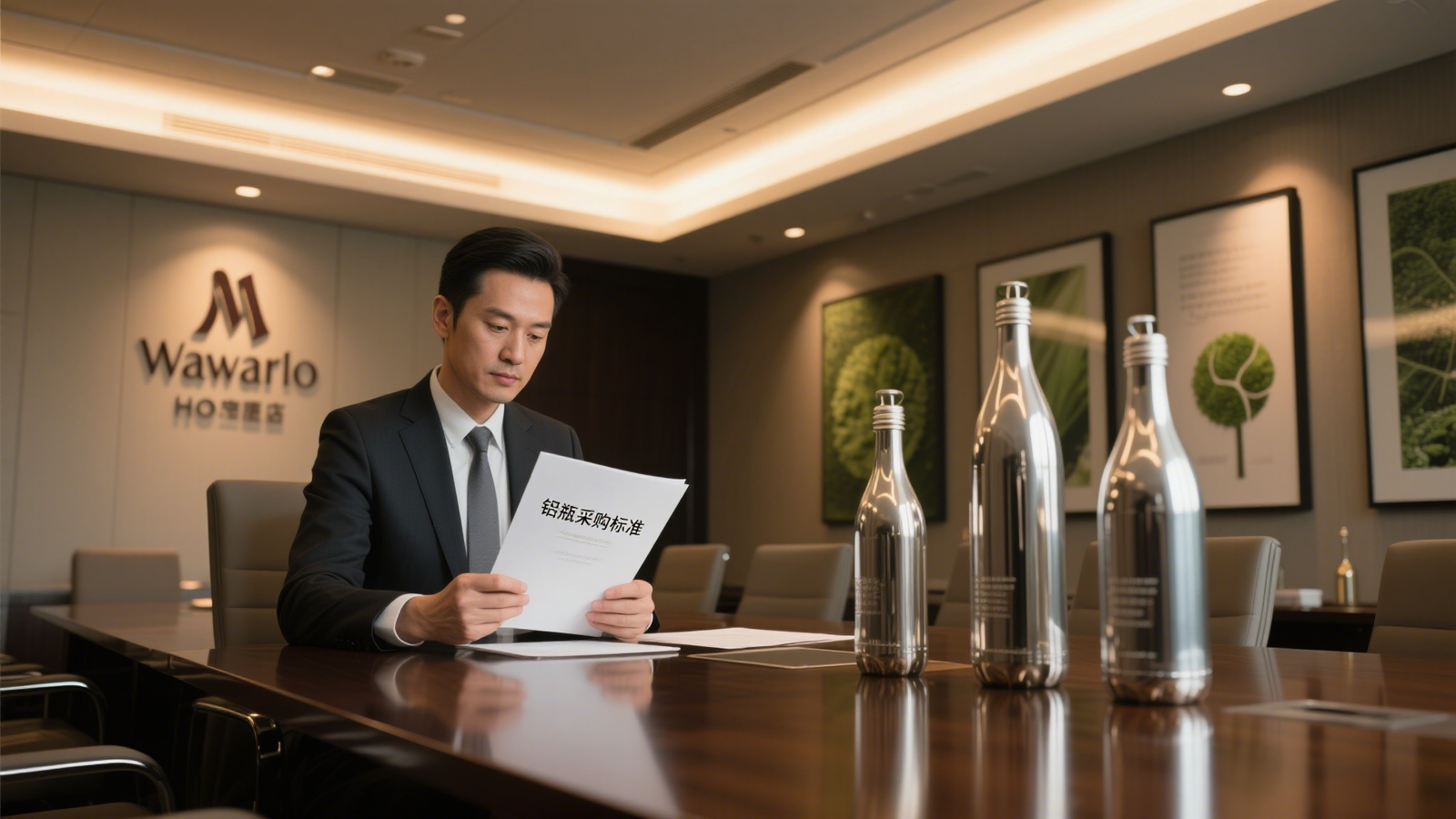Why Luxury Hotels Are Ditching Plastic Dispensers: Marriott Sourcing Director’s 5 Aluminum Bottle Standards

A silent revolution is sweeping global hospitality: miniature single-use plastic toiletry bottles are fading from guest rooms, driven by policy shifts and consumer evolution. In early 2024, China’s Hotel Association and three industry bodies jointly mandated that all accommodations “cease proactively providing disposable plastic amenities”—including shampoo and body wash containers. This echoes broader trends: the EU requires hotels to achieve 10% reusable packaging by 2030, rising to 40% by 2040. Amid this transition, luxury giants like Marriott are pivoting to aluminum bottles, a shift reflecting strategic recalibrations around safety, sustainability, and brand value.
I. Plastic’s Hidden Costs: From Policy Bans to Consumer Awakening
Plastic bottles once dominated for their low cost and convenience, but their environmental and health toll is now undeniable:
Chemical Leaching Risks: Phthalates in plastics can migrate into products—especially when exposed to essential oils or alcohols—disrupting endocrine functions.
Pollution Lock-in: A single 30ml plastic bottle takes 200+ years to decompose. The industry discards billions annually, with China alone generating over 100,000 tons/year.
Regulatory Pressure: China’s plastic restriction order mandates full elimination in hotels by 2025, mirroring South Korean and Japanese legislation.
Shenzhen JW Marriott’s 2024 tender for housekeeping services included “refillable detergent systems” as non-negotiable—proving commitment to circular solutions.
II. Aluminum’s Ascent: Marriott’s 5 Sourcing Criteria
As gatekeepers of supply chains, Marriott’s sourcing directors apply rigorous standards to aluminum bottles, revealing industry priorities:
Safety Compliance, Medical-Grade Barriers
Bottles must meet GB 4806.9 food-contact standards with acid/alkali-resistant linings for zero leaching. This parallels pharmaceutical glass protocols (e.g., Schott’s GMP certification), eliminating contamination risks. Unlike plastics that release polymers and create “plastic odor,” aluminum’s metallic inertness preserves scent integrity.Superior Sealing, Decade-Long Preservation
Caps must comply with BB/T 0034-2017 “Tamper-Evident Aluminum Caps” standards, using imported foil seals for oxygen permeability ≤0.1 cc/pkg·day. Such designs enable 10+ year preservation in wine bottles. For hotels, rose-scented shampoo retains freshness for 3 months post-opening—avoiding plastic-induced oxidation.Circular Design, Full Lifecycle Control
Bottles and pumps must withstand 50+ refill cycles, with ≥99.5% aluminum purity to ensure recyclability. EU studies show 50% hotel reuse rates by 2030 could save 27.1 million tons of resources and €10.4 billion. Aluminum recycling uses just 5% of virgin ore energy—key to carbon neutrality pledges.Brand Alignment, Luxury Customization
Anodized surfaces must enable Pantone color matching (e.g., Hermès orange, Tiffany blue) and resist hotel steam sterilization. Winemaker Zixuan already uses six-color aluminum caps (red, blue, black, white, purple, pink), proving aluminum’s versatility in premium branding.Scale Capacity, Million-Unit Deliverability
Suppliers require ≥¥2 million registered capital and 5+ comparable projects to guarantee monthly million-bottle output. This matches hotel chains’ global footprints—InterContinental’s 600+ China properties alone demand 20+ million bottles annually.
III. From Cost Center to Value Engine: Aluminum’s Business Revolution
While aluminum’s upfront cost is 3× plastic, its long-term economics are transformative:
60% Material Reduction: Shanghai Puli Hotel cut toiletry purchases by 72% and refilling labor by 40% after switching to bulk aluminum.
Brand Premium: 78% of guests pay up to 15% more for hotels with eco-packaging.
Regulatory De-risking: Non-compliant hotels face ¥100,000 fines per violation—aluminum bottles systematically ensure compliance.
Deeper value lies in experience redesign. When Hangzhou Aman paired aluminum bottles with bamboo trays, 34% of guests purchased the same scents—turning packaging into brand assets.
IV. Global Implementation: Reshaping Hotel Supply Chains
Leading groups have built end-to-end aluminum ecosystems:
Procurement: Shenzhou Bio adopts ±10mm dimensional precision (520×260×380mm) for stacking stability.
Quality Control: Implements “sensory + lab dual checks”—inspecting odors, dents, and coatings like food-grade audits.
Circularity: Marriott uses RFID-tagged bottles for cross-property tracking, linking reuse counts to supplier payments.
Industry collaboration accelerates progress—China Resources’ bidding platform now lists “aluminum bottle crates” as a dedicated category, standardizing sustainable packaging.
Aluminum’s rise in luxury hospitality transcends material substitution. It signifies an evolution from “rapid consumption” to “eternal circularity.” When guests touch the cool metal surface, they feel a trinity of commitments: material protection for ingredients, brand promise for experiences, and human reverence for the planet. Behind Marriott’s five standards, an aluminum-powered revolution is redefining luxury: true sustainability never compromises quality—instead, it unites both in metal’s enduring brilliance.
Key Advantages of Aluminum Bottles:
✅ Zero Contamination: Food-grade linings prevent chemical leaching
✅ Extended Preservation: Military-grade sealing maintains product integrity
✅ Circular Economy: 95% energy savings in recycling vs. virgin materials
✅ Brand Premiumization: Custom colors/finishes elevate perceived value
